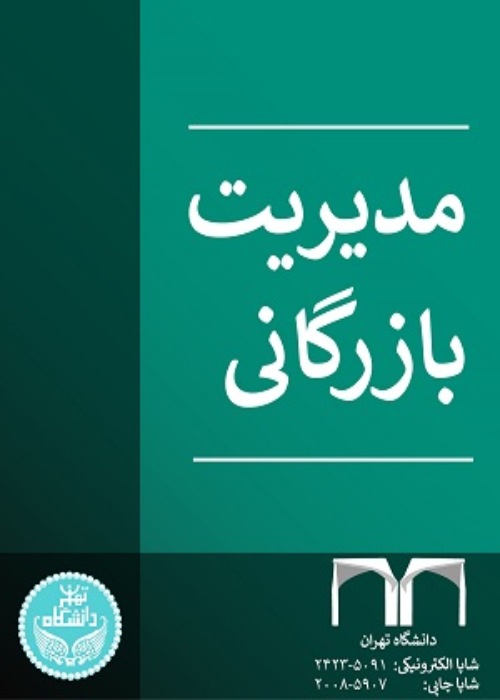Developing a Loyalty Model Based on the Customers’ Experience in Hotel Industry Using Grounded Theory Strategy
Author(s):
Article Type:
Research/Original Article (دارای رتبه معتبر)
Abstract:
Objective
Crucial success in tourism industry would be feasible through customers’ loyalty and their experiences. Accordingly, one can argue that organizations and companies need to do their best to build long-term relationships with their customers in order to create loyalty among the customers. Customer’s experience is considered as one of the recent basic changes within the customer service management literature. Nowadays, organizations provide the new customers with their customers’ experiences as an organizational brand. There is a consensus over the fact that shaping customer experience is important to create loyalty and that it can be considered as a key strategy producing wider and more capacities within tourism industry. The present study aims to investigate the customers’ experience as an important factor affecting customer loyalty. Therefore, we need a comprehensive instrument to determine loyalty based on customers’ experience, an instrument that can cover the weaknesses of the previous ones. This study aims at providing a model to determine customers’ loyalty based on their experiences to get over with the flaws of the existing models and to evaluate the tangible and invisible dimensions of customer’s loyalty using a procedural approach. Hence, hoteliers will be able to set positive and effective goals and plans in order to improve their customer services.Methodology
This is a fundamental-applied research aiming at providing a model of loyalty based on customers’ experience in hoteling industry. In addition, the study is considered as a non-experimental research. Qualitative research method and more specifically, systematic grounded theory method was used to respond to the research question. The research population includes related academicians and experts and the managers of four- and five-star hotels in Shiraz. Theoretical sampling was used as the sampling procedure. The data were collected through face to face interview with the experts and in-depth interview with hotel managers. A total number of 25 interviews were conducted and the codes for written interviews were analyzed afterwards.Findings
Comparing the present model with the models of the previous studies shows that this model enjoys a multifold procedural approach which focuses on the affective factors, consequences and causal relationships between the variables and attempts to amend for the flaws of the previous models. According to this model, causal loyalty conditions, issue-orientation, strategies and consequences, background and intervening conditions are all taken into account. Such a procedure employs a comprehensive approach toward customer’s loyalty based on experience. In addition, the role of intra- and inter-marketing conditions, particularly experiential marketing, on attracting and maintaining customers are highlighted. Implementation of the procedures and strategies are possible if complex conditions like customers’ mental development and hoteling industry capabilities are sought. The model suggests that implementation of such approaches is possible in case a set of strategies and measures are practiced. Such approaches such as providing better services to the customers, customers’ satisfaction, meeting with the customers’ needs, added value, service personalization, and fair pricing can lead to the implementation of customer’s loyalty procedure. Findings of the research obtained from the triple open, axial and selective coding stages indicate that the final model consists of 6 general categories (causal conditions, background conditions, intervening conditions, issue-orientation, strategies and consequences), 14 sub-categories and 54 main concepts.Conclusion
Based on the consequences obtained from customers, organization, and the society regarding loyalty, hotels can increase the social welfare and society general quality through creating economic and social capital. Therefore, hotels should consider the causal, background and intervening conditions around themselves and should emphasize on customers’ loyalty related procedures and measures within their internal and external limitations and capabilities in order to ensure benefits to the hotels, the society and their own customers. From the applied perspective, the present study can help hotel managers in Iran to assess their existing conditions in order to increase their customers’ loyalty. Therefore, the quality of hotel staff, the environment and physical space, and the services are considered as the causal factors affecting the perception and expectations of the customer from the services and the hotels. This leads to the creation of multiple value strategies for the customers and the consequences of such value creation will determine the degree of loyalty. On the other hand, academically, the present study shows that researchers are unaware of many issues regarding customers’ experience that can be investigated in future.Keywords:
Language:
Persian
Published:
Quarterly Journal of Business Management, Volume:11 Issue: 39, 2019
Pages:
125 to 140
magiran.com/p1937749
دانلود و مطالعه متن این مقاله با یکی از روشهای زیر امکان پذیر است:
اشتراک شخصی
با عضویت و پرداخت آنلاین حق اشتراک یکساله به مبلغ 1,390,000ريال میتوانید 70 عنوان مطلب دانلود کنید!
اشتراک سازمانی
به کتابخانه دانشگاه یا محل کار خود پیشنهاد کنید تا اشتراک سازمانی این پایگاه را برای دسترسی نامحدود همه کاربران به متن مطالب تهیه نمایند!
توجه!
- حق عضویت دریافتی صرف حمایت از نشریات عضو و نگهداری، تکمیل و توسعه مگیران میشود.
- پرداخت حق اشتراک و دانلود مقالات اجازه بازنشر آن در سایر رسانههای چاپی و دیجیتال را به کاربر نمیدهد.
دسترسی سراسری کاربران دانشگاه پیام نور!
اعضای هیئت علمی و دانشجویان دانشگاه پیام نور در سراسر کشور، در صورت ثبت نام با ایمیل دانشگاهی، تا پایان فروردین ماه 1403 به مقالات سایت دسترسی خواهند داشت!
In order to view content subscription is required
Personal subscription
Subscribe magiran.com for 70 € euros via PayPal and download 70 articles during a year.
Organization subscription
Please contact us to subscribe your university or library for unlimited access!


